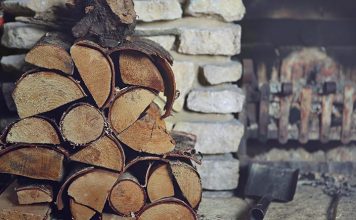| Issue #115 • January/February, 2009 |
There is an old Chinese curse, “May you live in interesting times.” Curse or not, times are interesting. We have world crises, national troubles, state level problems, county and local ills, and most likely your own family worries about the future. The root of all these problems is money and the power that comes with money. It is not quite that simple, but close enough for this article.

Let’s consider a plan that will get you the money and power needed for you and your family plus make life interesting in a positive way. This plan would help young people just starting out in life. Older people with reasons to start over, voluntarily or out of necessity, can use it too. The subject of this plan is the most expensive commitment most people make in their lives.
Purchasing your home is that weighty financial commitment.
The decision to buy a home is such a complicated operation that some vital facts become obscured during meetings with real estate dealers, lawyers and bankers, while searching for your new home, during the process of getting qualified, and handling the details of a closing. Let’s focus on two of those vital facts.
First is the real cost of a home, in terms of money. As an example let’s use a three bedroom modular Cape on a modest lot in a nice subdivision. The price is $180,000. With the changes in the real estate market and house values these days, this is still an average price.
Let’s say you have worked hard and saved $20,000 for a down payment and you acquire a 20-year mortgage at 6% interest on the $160,000 principal. Your monthly payment will be $1145.60 per month, plus a few dollars for various fees that banks add on.
Some people stop and congratulate themselves at this point. They have found their home, they accept the monthly payment challenge, and settle in for the long haul of paying off the mortgage. That payoff, after 240 months, is about $275,000. Add in the down payment and “fees” and you have a total of approximately $300,000. Very sobering.
However, here is where reality really takes a bite. To get that $300,000 you had to earn it. Before you paid the mortgage each month, even while you were saving up the down payment, you were making payroll taxes and having other deductions removed from your paycheck. In order to have $300,000 available to purchase your home you had to earn over $400,000. That is financially brutal, and I am underestimating that figure!
Now, I know there are accountant types out there who will talk about deductions and appreciation and “building equity” and all that. Those nebulous benefits are more than canceled out by ever-rising insurance premiums, maintenance costs, property taxes, and, most recently the housing market collapse.
My point is that you will obligate yourself to pay a huge sum of money for your home that, ironically, won’t truly be yours until the last payment is made.
Take a deep breath because there is another frequently overlooked obligation you committed to when buying your home and it is just as disturbing. Let’s say you have a job at United Switch and Knob Company, Ltd. making $50,000 per year. That is your salary for putting in 40 hours per week with two weeks off for vacation, or 2000 hours at $25 per hour.
The $400,000 needed to buy your home divided by $25 equals 16,000 hours of your labor, or eight solid years of work (16,000 hours divided by 2000 hours per year).
That is eight years of paying for absolutely nothing but the house! Well…actually house + interest + payroll taxes. No food, no car, no TV. Only house.
|
It is depressing, but don’t dwell on it too long. Let’s move on to another subject.
There comes a point in each of our lives when we have to decide how to make a living. That point usually arrives around high school graduation time and the choices are:
1) Get a job.
2) Go to college.
A job gets you started in life with an immediate income and, if you are a good worker, you will receive regular raises and earn promotions. You are able start a family, buy a home, and retire with a pension and maybe a nice watch. It can be a pretty good life. Well…not these days, but it used to be and perhaps will be again.
Then there is the college route, available to more people in this country today than ever before. In fact, having a degree is almost as necessary as a high school education was when I was young. Well…younger.
Problem is, college costs a lot of money. If your family can’t pay for it you need to get loans and work your way through school, stopping occasionally for a cold beer, maybe a bit of partying. The point is, you will have to survive without much disposable income and few possessions during your period of educational enrichment.
After two, four, six, or more years of hard work you graduate with that precious piece of paper. You have built up a huge debt but you are now qualified to get A Job. Sorry. I mean A Position!
My idea is for you to study (and accomplish) building a home rather than pursue a college degree. Get your own PhD in Home Building.
Shocking? Probably. Let’s compare the two choices and their impact on your future. While comparing, do not think of this as a possibility only for 20-year-olds. At about any point in your life you could decide it’s time for a change and go for it.
Let’s start with money. College costs money. Building a house costs money. The expenses in each case vary so much that specific amounts don’t mean much at this stage of planning, but it will be a lot.
Just to get a basic college degree takes at least two years. For the Home Building PhD, plan on a time frame of two years also. So for either of these choices you need two years’ time, a commitment of a substantial amount of money while not working for a living.
Study is necessary for college. Studying will require much of your time while home building too. Studying plans and following directions for assembling things correctly is an expected part of a home building career, just like studying and taking tests is part of college life.
A college degree and this home building degree are taught through “courses.” The first year at college consists of basic courses to help you progress to the next level. The first year of home building, the way I am giving it to you, uses something similar to courses in order to prepare you for the next level.
If you convince yourself to go after a degree in Home Building just as diligently as you would pursue a degree in Liberal Arts at college and give it the same level of dedication and commitment, you will accomplish a valuable goal. The college degree gets you ready for a better job. The Home Building degree gets you a home and much more.
Year One
Ready? Let’s rough out a time budget. During Year One you will be rearranging your life to focus on the many jobs, details, and the studies necessary to get you to the actual point of building something. I’ll give you suggestions on how to manage money, point out subjects to study, basic tools you will and won’t need, how to find the best building project, and options for customizing your curriculum during Year One, which may take more or less than a year. Much depends upon your ambition.
Year Two involves putting what you have learned to use by doing a real project. I will show you three projects ranging from hard, to harder, to very hard. I hope you were not expecting this to be a cakewalk.
|
Next issue is money. Let’s start with where you would get the money for a college education. Suppose you are a fresh young high school graduate, full of hope and ambition but financially worthless. Where would tuition money come from? Mom and Dad (mostly Dad) would be the first source, hopefully with the addition of a scholarship and probably student loans. After that you might consider the military. You are thinking like a student.
Compare that to obtaining money to build a home. You are that same brokeyet hopefulyoung person and you want to learn Home Building. Where would you seek funds? Well, start with Mom and Dad as before. Then instead of college loans look for Venture Capital. Sounds exciting, and it is. It means you can expand the hunt for financing to include Uncle Dilbert, a wealthy family friend, a bank, or a credit union. You won’t have to resort to the military. Now you are thinking like a businessman, which is only one of the professions you will learn during this course.
You can seek venture capital with confidence and a better chance of success because instead of looking for a handout you will be borrowing in a businesslike manner, with legal paperwork, and you will be paying back your loans with interest. However, before we even get to the borrowing stage, read on. You will see a plan developing here.
More than money, you need knowledge. I recommend you plan on having one, better yet, two jobs during the whole first year of this course in home building. These jobs should be in the actual field of building. Hire on at a worksite and learn all you can by direct experience. Work with a mason for a while, then a framer, then a roofer, then a drywall installer, and learn about finish work. Making money while learning was called an apprenticeship in the old days.
Watch closely the way each professional performs his job. Be especially observant of the plumbers and electricians. Be respectful and learn a lot. Take notes, lots of notes. Start your own reference book with a loose-leaf binder, or computer. Take pictures too. This information will be gold to you later on.
This work binge does not have to be done in your own town. In fact, there may not be enough house building locally to give you the broad based experience you need. If you are young and fancy free maybe you could go to New Orleans, or Galveston, or Florida where they are begging for construction workers. The pay is very good and your learning curve steep. It would be a good adventure out in the real world for you. Maybe take a friend or two along to share expenses and watch out for each other.
Being away from hometown temptations might help you save your money. Of course, I have heard there are temptations in the city too. Perhaps your paychecks could be sent to Mom and Dad for safekeeping. You know yourself better than I do.
So, at the end of ten months, more or less, you should have a very savvy hands-on understanding of professional building construction with notes and photos to study later. You should have a good stash of money in the bank too. Mom and Dad will be so proud of you they may insist on giving you venture capital right then. Other loan sources include banks and credit unions. Even Uncle Dilbert will have more respect for your proposal if you have money in the bank when asking for a loan.
That’s my advice for individuals who are 20-something and want to take on this plan. Older people, say 25 to 35 year olds, with a few miles on them can do this too. I was 29 when I decided to build my first home. I had obligations, a job, a mortgage, and hardly any savings. Does that sound like you?
On the plus side, I had a few assets. I had a nearly paid off car, a stamp and coin collection, plus other semi- precious items accumulated from my youth. I had a special motorcycle I built myself and my little house was about one third paid for.
I advise you to sell anything you have that’s worth money. You knew I was going to say that, didn’t you? It hurts for a while, but you can console yourself with the thought of how much better stuff you can afford in a couple of years. Repeating the phrase, “He who owns little is little owned,” helps too.
Anything you owe payments on should go next. I sold my nice car and replaced it with an old pickup truck that I bought for a few hundred dollars. I estimated it would last two years (it lasted eight, great truck). All the money went into a credit union because their interest rate was higher than a bank and I wanted their cooperation when I needed loans later.
I saved a surprising amount of money by altering my entertainment and social life. It was shocking to realize how much money slipped away there. I actually had to limit myself to only two steady girlfriends! It was tough!
Everyone has different circumstances but the procedure is the same. Sell everything you can to lower your debts and expenses as drastically as possible (plus 10% more) and stash your savings in an interest bearing account. All this should be accomplished during the first year, which is long enough to do it gracefully. You won’t feel too deprived because there will be plenty of interesting things happening to keep you occupied.
Take the first year to rearrange your assets to the point where you are out of debt, have some savings, and your only bills are living expenses for food, utilities, and maybe rent. It will be a drastic change for most people, especially those beyond thirty-something who have become used to a secure routine of having a place to come home to after work each day. However, this is an adventure and such things require risks.
Another “course” for you to pursue during the first year is collecting building materials. Not just any old stuff but quality items. We have a swap and sell periodical that covers our state and it is always full of low priced building materials. Visits to discount and overrun factory outlet stores are excellent sources.
During the planning stage of my first home building project there was a flood in our town. Three weeks later I was exploring the flood plane where the river entered a local lake and found materials from swept away buildings, wood plank bridges, and a lumber mill, plus other treasures, too numerous to mention, clustered around trees like huge bee hives. I called other friends who were builders and we hauled away enough material to build three houses. There was so much left over we had trade items for years. I took that as an omen that building was my destiny.
Gathering materials and planning a whole building project around what you’ve found may not be the best idea for your first project. However, keep this option in mind and even if you do not use the building treasures you found they are good trade items or useful in one or two of the building choices I’ll give you for Year Two.
|
During the first year look for good deals on some basic tools. A hammer, some wrenches, a skill saw, a 10″ table saw, and several electric drills. Although I have collected other tools over the years, just a few basics are plenty and finding good used ones for little money is easy. Swap and sell sections of the newspaper or periodicals, pawnshops, and yard sales are good places to find bargains.
Here is another “course” to prepare you for Year Two. Obtain and study every bit of information about building that you can. Thousands of books covering every aspect of building you will ever encounter have been written. Browse the shelves of a large bookstore. See what a home building center has to offer. Your local library may carry many good books and periodicals. Magazines, like the one you hold in your hands now, will give you plenty of useful information and ideas. That modern wonderGoogleis available to anyone with a computer and offers even more help.
As you are absorbing information, saving up your money, collecting materials, and working at building sites, take on another task. You will be building your project somewhere. The most important aspect of real estate is location, location, and location. You need to find the area where you want your project to be and learn about it. Whether it is to be your home or someone else’s, certain local amenities will make the home’s location as desirable as possible.
Do you prefer city, town, or rural areas? Nearby schools, short commute to work? How important is the absence of annoying noises, neighbors, smells, and ugly views?
The best way to learn about these things is from the local newspaper. The real estate section gives you home values. The police blotter gives a sense of how safe an area is. News stories give you a sense of what the place is like. You need to study a potential location, or several of them, so you have choices. I like to get maps of an area and mark places to avoid and ones to study further. Tracking information over a long period of time tells you a lot before you have to make reconnaissance trips to the place.
You may know your own neighborhood and town well, but who is to say that is where your home building project should be? Better locations some distance away may be more desirable or profitable for you.
Let’s review your first year’s curriculum. Sell everything you can. Save money. Learn by taking jobs building homes. Take notes and pictures. Acquire an old truck and collect materials. Buy basic tools. Live like a monk and study books, magazines, and newspapers while planning Year Two. At the end of Year One you will have gained home building and repair skills. Get the word out that you can do home repairs and you will have all the employment you can handle.
Year Two
If you can resist that temptation, let’s move on to Year Two. You could start right in and build a whole house from scratch. In fact, you may have thought that is what I was going to suggest when I started all this. Not so. A number of alternatives might be better suited for a starter project. So let’s skip right over building from the ground up and talk about another approach, which I am not fond of, that is worth considering.
Taking on a “fixer-upper” can be profitable…
- IFyou can find one for a low price. There is a good chance of that these days.
- IFit is in a good location where it will sell when finished, or when the present real estate market straightens out.
- IFthe fixing up part is within your skill set.
- IFthe cost of rehabbing it is within a realistic budget.
- IFthere are no surprises when you start repairs. Usually there are and they may not just be structural. Make sure you hire your own lawyer when you buy any property. Do not rely on a real estate dealer or the seller’s attorney to handle all the paperwork.
- IFyou treat the place as a business and don’t fall in love with it.
A Fixer has its advantages. You could move right in to save the cost of rent and utilities of living elsewhere. Camping out in your fixer-upper means you’ll have lots more hours per day to work, shortening the overall time needed to finish the project. You are not there to enjoy the comforts of home. You are there to work. Pretend it’s a sort of combat mission.
For those of you already living in a home with a mortgage you could consider that as your fixer-upper. Upgrade, rehab, landscape, or put on an addition and sell it. You already know all the shortcomings that need attention to get the place marketable. This would be the most logical plan for many of you.
Let’s get back to the “combat mission.” Fixing up an existing home means you could do your project anywhere. Along the Gulf Coast of the U.S. from Florida to Texas is fixer-upper paradise now and for the foreseeable future. Any cities doing rehabilitation of rundown neighborhoods offer opportunities too.
Working on an existing home means you will be learning by repairing rather than learning by constructing. That’s a big difference early in your career and you will learn more than you can imagine.
The large number of foreclosures these days means some homes are left unoccupied. Many of them will suffer damage from vandalism or weather and from not being maintained. This puts you in a good position to buy an abandoned home at a low price from the mortgage holder.
|
Note: I recently heard of a new businesskeeping empty foreclosed homes maintained and looking like someone lives there. Real estate dealers, banks, mortgage companies, and absentee owners are potential customers. Good idea.
I know that people who are naturally good at doing things tend to think anyone could do them if they really wanted to. Building a house from scratch is one of those “things.” A fixer-upper may be the transition project that makes you a good builder.
The next project to consider for Year Two is buying a mobile home on its own lot, using it as a place to live and work while building a new home on the property. When the new home is done have the mobile home towed away.
Mobile home properties are often jewels waiting to be shined up. They are on the low end of property values but have all the expensive improvements in place, saving a great amount of money, time, and labor over starting with a vacant lot. If you work carefully, the new house you put there won’t disturb the nice landscaping that often comes with a property like this.
Of course you must abide by the first law of real estate…location, location, location. Find a mobile home in a neighborhood where you will be bringing the value of the property up to the value of the rest of the homes, maybe even turning it into the best one there.
Financing a mobile home on a private lot is like any real estate transaction except the price will be lower (if you shopped well) than a regular home. Your down payment and monthly payments will be smaller, leaving more of your investment money available for building materials and other expenses.
Moving into a mobile home and making it useful is easy. Set up “camp” by using the existing kitchen and bathroom and turning the living room into sleeping quarters. Clear out the bedrooms and use the space for a workshop and storage of building materials. A small efficient living space keeps housework to a minimum. Living on-site saves the expense of maintaining another home elsewhere and eliminates commuting. It lets you work more hours per day, more days per week. Your constant presence protects the project from mischief.
The mobile home itself has potential. If it is in good shape you can sell it privately or to a dealer when you are finished with it, recouping some of your investment. It is also possible to disassemble the thing and use the materials and equipment in your new project. Think about that. All the plumbing, fixtures, range, refrigerator, cabinets, doors, paneling, lumber, insulation, windows, and more are items you may not have to buy elsewhere. Once the mobile home is stripped down to the frame and wheels you can sell it for a good price to someone who builds cargo trailers.
You can search a long distance from your present location to find a suitable mobile home project. Some distant town or city may have better potential than your local area. Be thorough in your assessment of real estate in the area you choose to do your project. Swoop in there, buy it, do the work, sell the finished house, and plan the next one.
What if your project does not sell immediately? You have increased the value of the property and can refinance the mortgage. This will give you money to live on until it sells or the capital to start another venture while renting out the first one.
This last idea for a project in Year Two is my favorite. I don’t like working on old houses and this has none of that. Consider putting a brand new modular home on a lot that you develop or on an improved lot, such as the mobile home idea just mentioned or the fixer-upper that you change to a tear-downer.
Modular home companies have good working relationships with banks and this is beneficial to you. Most can help you with financing and developing the lot as well as the home itself.
Modular homes are available in a wide price range and many levels of luxury. They are popular not just for the speed of construction. You choose the size and shape. You get to pick out the colors and types of flooring, counters, trim boards, siding, and roofing. You also select window and door styles and where you want them located on the building. These homes are built under the best possible conditions in a nice dry indoor factory and lots of glue holds them together. The modular units must survive being hauled hundreds of miles and getting swung through the air from a crane. This extra toughness means these houses have a very high structural integrity.
On the inside, the company installs the plumbing, furnace, and air conditioning. They also install cabinets, counters, appliances, carpets, and trim in the type and colors you choose. Sign the contract and have a custom home in a month.
Theoretically, and if the housing market were better, you could order a modular home, have it set on your lot and sell it right away at a profit. Since that is not the case now, with the present housing crunch, let’s modify this concept.
Imagine the modular home contract as a menu. You can order each part or service separately. So, how does this benefit you, the PhD Home Builder?
|
You have learned skills and it is time to use them. The more work you do on the house yourself, the more money you save and the larger your profit will be. Suppose you manage the site work on a raw lot. Choosing and negotiating with contractors you select can save considerable sums.
Haggling with the modular home company about package prices and doing all the work you possibly can, by yourself, saves you even more money. Have the modular company deliver and set the units on your foundation but you do all the finish work. Completing the siding, installing the carpets, and doing all the details the modular crew usually takes care of cuts a lot off the price.
You can order the most basic, stripped down home package and add your own cabinets, counters, appliances, carpets, and other details and save even more. Some modular styles come with unfinished second floors. Adding two rooms and a bath up there adds big value to the home. You could install your own siding, doors, windows, and shutters. You could add dormers, construct a deck, build a fireplace, and add a garage. Such projects add value to the home, and this is the time to get them done.
How much money can you expect to spend, and make? With an easy search I found a 24′ x 36′ modular Cape style home. The deal includes crane set, exterior finish, and interior touch-up for $56,200 including sales tax (down $2000 from a year ago). Budgeting $30,000 for the improved lot and $10,000 for incidentals adds up to $96,200. How much is that worth in your area? I don’t know, but here it is worth well over $200,000 even in times like this.
With your two-year Home Building PhD you can cut the price of a home for you and your family by at least half. If you sell your initial project you could pay off all you owe and have the funds to build a second house free and clear and probably have money left over.
When you consider all the marketable skills learned while building a home and the money you save by not needing a big mortgage, the career you could have by using your Home Building PhD more than equals what a college education will do for you. But if you still feel the need, build a third home, sell it, and put yourself through college debt free.




















